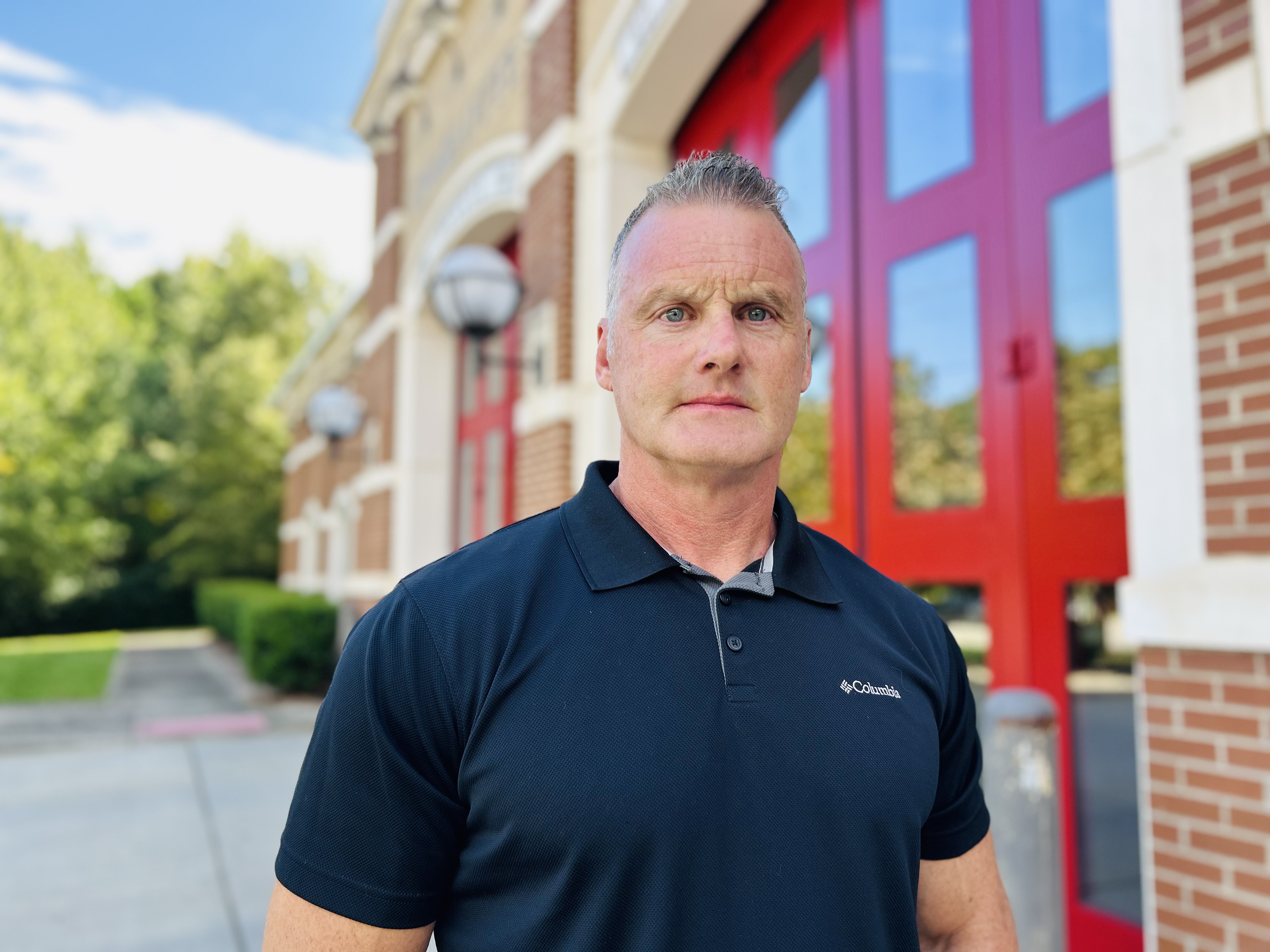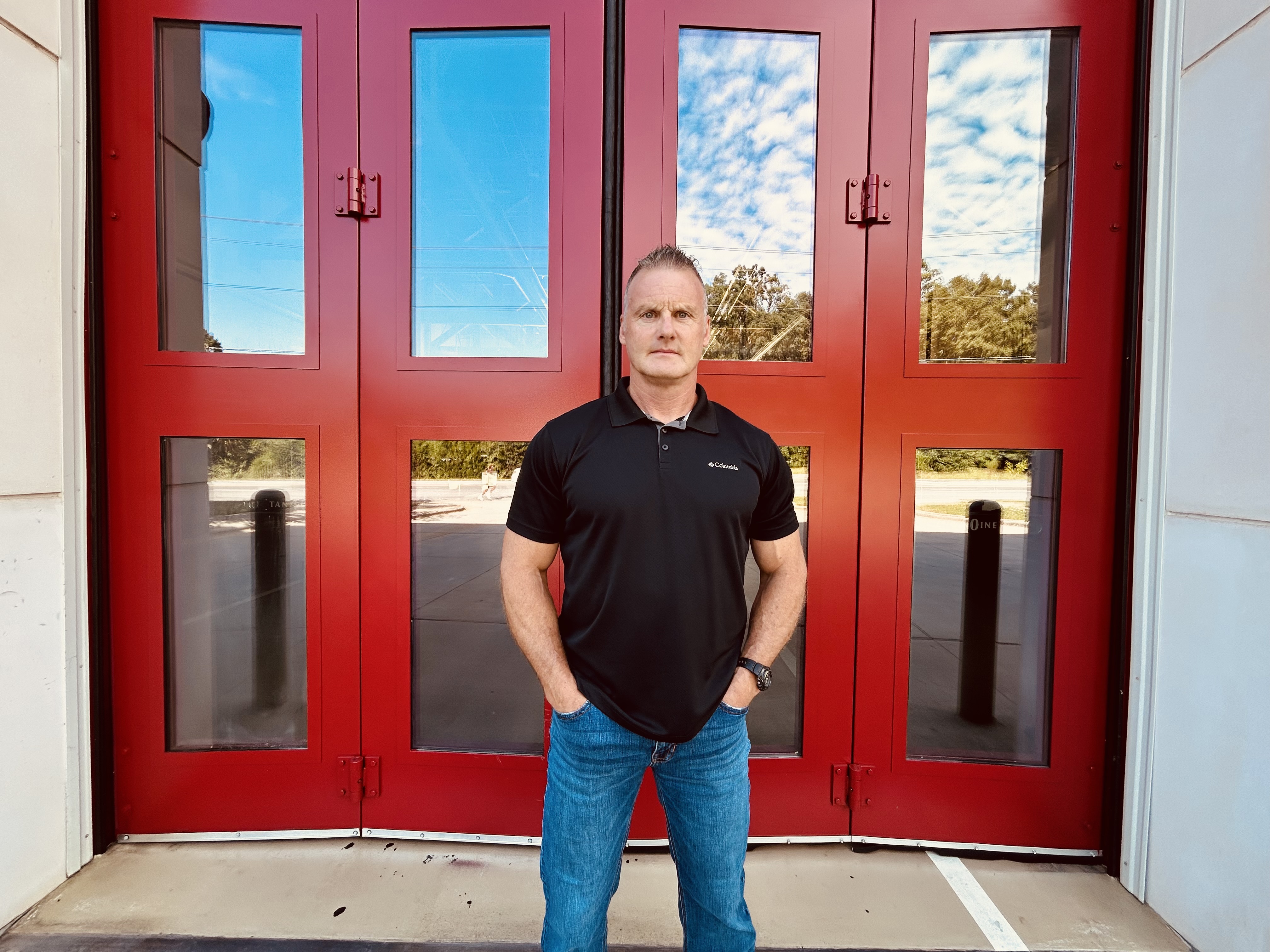Life After Cancer: A Retired Charlotte Firefighter’s New Chapter
Published on September 29, 2025

Close-up of retired Captain Scott Walker inside the firehouse bay, his eyes reflecting both the battles fought and life beyond cancer.
FACING THE FIRE WITHIN
“Every day is Saturday.” That is how retired Charlotte Fire Captain Scott Walker sums up his life now. The phrase is said with humor, but after 25 years in the fire service and a fight with prostate cancer, it carries a weight that only those who have walked through both careers and illness truly understand. For Walker, it is a reminder that even after hardship, life can still be rich, full, and worth celebrating.

Retired Charlotte Fire Captain Scott Walker stands in front of a ladder truck during an interview reflecting on life after cancer.
Walker’s journey into the fire service began far north of Charlotte, in the small town of Fulton, New York, just outside Syracuse. He was in his early 20s, working in commercial construction, when the prospect of spending a lifetime behind a jackhammer in freezing winters began to weigh on him.
“Running a jackhammer in 20-degree weather wasn’t what I wanted to do for the rest of my life,” Walker recalled. Friends from his hometown fire department planted the seed, and Walker realized firefighting combined steady work, good benefits, and a hands-on job where his skills would translate well.
His brother, already living in Charlotte and serving as a police officer, gave him another reason to head south. “It was the right move,” Walker said. “I knew the pay, the retirement, and the work itself were right up my alley.”

An early career photo of Walker while serving as an engineer on Ladder 27, a reminder of the years before his retirement and cancer diagnosis.
Walker was hired by Charlotte Fire in 1997. He entered the academy with little knowledge of what to expect but quickly found his footing. “I didn’t know anything about it on that first day, but they taught you everything you needed,” he said.
Over the years, Walker moved steadily upward. He became a driver within six years and spent much of his career at Firehouse 27, where he served under a captain he admired. Later, he rotated to different assignments, eventually earning the rank of captain in 2018 after completing a two-year degree in his 40s to qualify for promotion.
Walker retired from Firehouse 31 in October 2022, proud of a career that gave him both professional satisfaction and a second family in the firehouse. But well before retirement, he had already been confronted with a life-changing diagnosis.

Walker stands confidently between two fire trucks, a reminder of his decades of service and resilience through health battles.
Prostate cancer was not a stranger to the Walker family. His father and several uncles had battled the disease. Aware of his risk, Walker began regular PSA screenings around age 45. “I made sure my primary care doctor knew my family history,” he said. “Every six months, I went in for blood work.”
For years, the tests came back reassuring. But in December 2018, during one of those routine visits, the results shifted. His PSA, which had held steady around one, jumped to 4.5. His doctor suggested he see a urologist. “That was a red flag,” Walker said.
A biopsy soon followed, confirming prostate cancer. He received the call while at a retirement party for another firefighter. “You hear that word and it just stops you,” he said. “The first thing I did was go home and spend two straight days on the computer, researching every clinic and every treatment I could find.”

Walker in front of the bright red bay doors, a striking image of strength and resilience after a career of service.
Like many patients, Walker considered multiple treatment paths. He read about a clinic in Georgia that specialized in advanced therapies. “It looked impressive when you searched it online,” he said.
But his urologist, Dr. Harrison Rhee of Urology Specialists of the Carolinas, gave him direct advice. “I asked him, if it were you, what would you do?” Walker recalled. “He said, ‘I’d have it removed. You’re too young. We need to keep you alive another 20 years.’ That settled it for me.”
In January 2019, Walker underwent surgery using the da Vinci robotic procedure. The operation successfully removed the cancer, but the year that followed tested him in other ways.

A black and white portrait of retired Captain Scott Walker inside a firehouse bay, symbolizing strength after his cancer journey.
Within three months, Walker endured three major operations. Just before his cancer surgery, he tore his tricep from his elbow and required repair. Once that healed, he underwent hip replacement surgery.
“2019 was terrible,” he said. “I had my arm in a cast, I had my prostate removed, then I had my hip replaced. For a firefighter who’s always moving, it messed with my head.”
Through that year, Walker leaned heavily on his wife Leslie. She went to appointments, stood by him during consultations, and carried the household while he recovered. From emptying catheters to mowing the lawn to caring for their teenage daughter, she stepped into roles he couldn’t. “She was my rock,” Walker said. “She took care of everything while I was trying to heal.”
Unable to work on the truck, Walker spent months on light duty at headquarters. The abrupt change in pace and routine challenged him mentally. “I gained weight, I got out of shape, and I wasn’t used to that,” he said. “Honestly, that was harder on me than the cancer itself.”
A wide portrait of Walker standing outside a firehouse, representing his transition from firefighter to life after retirement.
Walker says his private nature meant many assumed his time off was only for arm surgery, not knowing he was also battling prostate cancer. That privacy made Leslie’s role even more important. “I didn’t tell many people,” he said. “But Leslie knew everything I was going through and never let me see her fears. She was strong when I couldn’t be.”
Still, he knew he was fortunate compared to some. Unlike many men, Walker did not face lasting complications with sexual function. “I was lucky,” he said. “Others have a much tougher road.”
Support came from many directions. His wife and daughter stood by him through every appointment. His fire department family stepped in too.
Assigned to light duty at headquarters, he shared space with Engineer Justin Barringer, who was undergoing chemotherapy for lymphoma. Watching a colleague struggle through draining treatments put Walker’s situation in perspective. “Justin was losing his hair, exhausted all the time. Compared to that, I felt lucky,” Walker said.

Walker leans against a fire truck, looking ahead with focus and determination about life beyond firefighting and cancer
The support of fellow firefighters also meant constant encouragement and connection. Walker remembers Chief Quentin Maver pulling over on his way to a Charlotte Knights game just to take Walker’s call and talk him through the diagnosis. “That helped a lot,” Walker said. “Talking to someone who’s been there calms you down.”
Those conversations shaped Walker’s approach moving forward. He began taking calls from other firefighters diagnosed with prostate cancer, offering to talk through what to expect. “When other guys called me—Brian Rodman, Russ Harwell, or retirees — I shared what I knew. I’d say, don’t panic. It’s slow moving if you catch it early. There are options.”
For Walker, those conversations have become a way of giving back. “I tell them, if you want to talk, call me. Don’t bottle it up. I’ll tell you what I went through and maybe it’ll make it easier,” he said. Over the years, he has fielded calls from several firefighters newly diagnosed. “You don’t want anyone to feel like they’re alone in this.”

With firehouse bay doors as the backdrop, Walker’s portrait highlights the lasting connection between firefighters and the places they served.
Now retired, Walker embraces the slower pace of life. He laughs when asked about the adjustment. “Every day is Saturday,” he said again. “I wake up without an alarm. I can spend time with family. After the surgeries, after the cancer, I don’t take that for granted.”
He is also looking forward to spending more time outdoors, especially when deer hunting season arrives. “That’s something I couldn’t always do when I was working shifts or recovering,” he said. “Now I’ve got the time, and I’m ready.”
He looks back with gratitude that he took his family history seriously and kept up with screenings. “Because of my history, I stayed on top of it,” Walker said. “If you’re in your 40s, especially with family who had prostate cancer, get your PSA checked. Don’t wait for symptoms. Early detection is why I’m here today.”

Seated on the bumper of a fire truck, Walker reflects on both his firefighting career and the challenges of cancer recovery.
Looking back, Walker also thinks about Leslie’s strength. “She was the one who made sure I could focus on getting better,” he said. “I’ll never forget that.”
For Scott Walker, life after cancer means more than survival. It means embracing each day with the awareness that time is precious, and sharing his experience so others know they are not alone. “I’ve been through the hard parts,” he said. “Now I just enjoy the days. And every day feels like Saturday.”
Editor’s note: Facing the Fire Within is a four-part series sharing the personal stories of Charlotte Firefighters diagnosed with prostate cancer. The series aims to raise awareness, encourage early detection, and ensure no firefighter faces this battle alone.
Read more about what Charlotte Fire is doing to fight cancer in our department-wide overview: CHARLOTTE FIRE'S PUSH TO BEAT CANCER